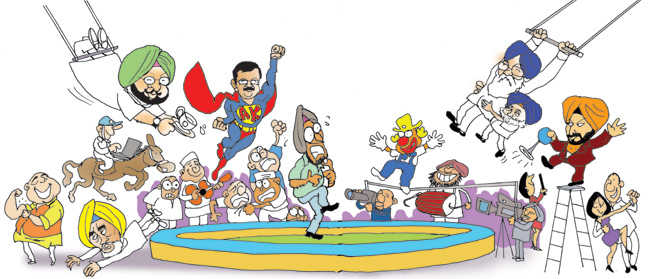
Illustration: Sandeep Joshi
Harish Khare
Outside of Punjab, people are confused by the ear-splitting cacophony that the various splinter groups of the Aam Aadmi Party have managed to drum up. Political space is being converted into a grand circus. Practising comedians and street singers are being injected on to the political stage, as the new saviours, primarily because of their ability to come up with masaaledaar one-liners. Navjot Singh Sidhu has now launched something called Awaaz-e-Punjab, after failing to arrive at any satisfactory understanding with Arvind Kejriwal. And, in a tiredly familiar fashion of a jilted lover, he had quite a mouthful to say about Kejriwal.
The same goes for the other jilted mistress, Sucha Singh Chhotepur. He had allowed himself to badmouth the very leader — Kejriwal — he was extolling till the other day.
And, to complicate the plot, Arvind Kejriwal himself is threatening to “stay” in Punjab — at least till the assembly elections. The AAP leader is finding himself subjected to the same treatment his party had meted out to the others — sting operations, CDs, false and motivated accusations and character assassination. Sauce for the goose is sauce for the gander.
The Badals’ strategy seems to be to encourage — and, if possible, finance —divisions and subdivisions in the “AAP constituency.” Kejriwal and his advisers would discover that unlike Sheila Dikshit, the Badals do not make a polite opponent; nor do they play by the rules. And, they are happily hell-bent on misusing the state government’s muscle and machinery.
The Congress leadership too is not displeased by this self-inflicted meltdown in the AAP ranks. The Congress leaders finally seem to be realising that if they can put up a united show till the election night, the battle is more than half won. But it is a very crucial “if” in the Congress scheme of things.
The BJP finds itself in a classic dharma sankat. Its national posture and pretension is that it wants to cleanse the ‘system’ of corruption and nepotism. It promises the people of India a robust and reinvigorated notion of ‘su-raj.’ But here in Punjab, it plays second fiddle to the Akali Dal, which in the last 10 years must have notched up a Guinness World Record in taking liberties with the tenets of su-raj. It should be interesting to wait and watch and see if Prime Minister Narendra Modi would allow himself to be persuaded to campaign for a return of the Akalis-BJP alliance. Or, Modi could take a leaf out of the LK Advani book. He had courageously distanced the BJP from the unsavoury Chautalas in the neighbouring Haryana.
But it is the AAP and its offshoots that hog the limelight for now. The only good the AAP crowd is doing to Punjab is that its unafraid and uninhibited campaign is shredding the Badals’ reputation to pieces. And, Navjot Sidhu has lent his considerable repertoire of tricks to peel layer after layer of the Badal onion.
Notwithstanding the grand confusion it has created, the AAP crowd has pretty much ensured that the Badals’ days are numbered. That itself would be a substantive achievement.
Last week, two of my senior colleagues and I were in Pune, participating in an interesting event called the “Pune Dialogue on National Security.” It brings together four organisations — Pune International Centre, The Tribune Trust, the Delhi-based Policy Perspectives Foundation and the Pune-based Centre for Advanced Strategic Studies — to provide a forum to discuss issues of national security. The dialogue is conducted on what is called “The Chatham House Rules”, according to which the participants are assured — and feel assured — that their candid observations on sensitive subjects would not be subjected to media’s scrutiny. This is a very useful rule. In Pune, we saw a gathering of about three dozen (mostly) men who have dealt with security issues at very, very high levels of national responsibility. It was good to meet so many old friends, who after retirement are now scattered all over India. As “The Chatham House Rules” do not permit disclosure of any details, it would be not quite kosher for me to reveal any names or even topics discussed. Apart from a very high quality of analysis and discussion, what was most reassuring was that despite our politicians’ preoccupation with petty and partisan matters, so many sober and serious men and women look at issues of national security from a national perspective.
For any society, it is bad enough that its political class remains perpetually at war with itself and it would be a most debilitating infliction if the Indian politicians are also able to inject their partisanship into the minds of the security community. We all need to put our heads together in a dispassionately professional spirit. Like it was done in the Pune Dialogue.
For any young scholar or writer wanting to know how to make history-telling an enjoyable enterprise, Jon Wilson’s India Conquered should be a must read. The central thesis of the book is that though the British imperialism held sway over the Indian subcontinent for 300 years, its hold was always precarious. And it was fragile and unsteady because those Englishmen who came to rule and administer India lacked values and virtues, and that they were primarily motivated by baser instincts like greed and power.
This is an argument that should be music to the modern day Indian ear. As a nation, we are experiencing a new sense of self-confidence and are in an insistent nationalist mood and, consequently, we are prepared to revise our history and its narratives. This book scratches our nationalist itch.
There is another way to read this book — or another lesson to be learnt from this book, a lesson that is all the more relevant to the understanding of our post-Independence difficulties. Wilson asserts that despite British success in asserting “their power on the surface of the earth, in roads, telegraphs, railway lines, survey boundary markers”, all aimed at re-engineering “the physical fabric of India”, the Englishmen failed “to create an ordered imperial society.” That indeed is the fundamental problem that has not been sorted out to satisfaction in many countries. If providing and imposing imperial rule in the vast stretches of land, from the Durand Line to Burma, was so demanding a task, governing a much truncated India in a democratic idiom has not been an easy enterprise either. Or rather, as Jawaharlal Nehru once remarked, his greatest challenge was how “to create a just society by just means.”
This remains the central task even today for anyone who has the responsibility to ‘rule’ from Delhi. Just look at the restiveness in Kashmir. Or a barely observed ‘peace’ in each of our north-eastern states.
Wilson’s book is a must for all our leaders for this reason: to understand the nature of authority in the Indian state. Wilson points out that the British were in good shape as long as they adhered to the tenets of the Mughal rule. According to him, the Mughal empire “sustained its authority by acknowledging the autonomy of different interests and nationalities, and that could include the English. Force was an important part of Mughal statecraft, but it was usually followed by some kind of attempts to negotiate as deals were struck between political leaders who had previously been rebellious and antagonistic.” The British started losing the plot once they strayed away from this central tenet.
It can be suggested that post-Independence leadership understood this essence of the authority in India. Our democratic enthusiasm and constitutional guarantees eventually coaxed very many rebels to become partners in national progress. For example, a very symbolic but enormously significant gesture was made in 1996, when the United Front government consented to have a man from the North-East, PA Sangma, as the Speaker of the Lok Sabha. At one level, the new and faster means of communication give us confidence, even over-confidence, that ‘Delhi’ can — and, must — impose itself on one and all throughout the land. For example, in the recent GST debate, ‘one nation, one tax’ slogan was coined. At another level, the old, even ancient, differences, diversities, and animosities remain unresolved. How much power to share with the provinces and peripheries remains central to ‘rule’ from Delhi. Wilson’s book is a timely reminder.
That reminds me somehow, it should be time for coffee. Do join.



























